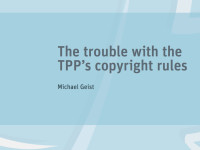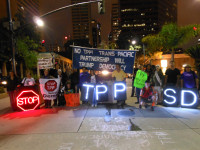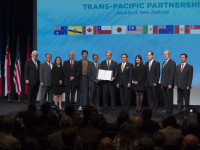For the past two months, the Canadian Centre for Policy Alternatives has been publishing an exceptionally important series on the problems with Trans Pacific Partnership. I was pleased to participate in this initiative and yesterday the CCPA posted my contribution. The Trouble with the TPP’s Copyright Rules draws on my earlier Trouble with the TPP series to highlight several of the copyright concerns associated with the agreement, including copyright term extension, the limited applicability of Canada’s notice-and-notice rules, and the expanded criminalization of copyright law.
Search Results for "The Trouble With the TPP" : 93
The Trouble With the TPP: Cost to the Canadian Economy Garnering Increasing Attention
Earlier this month, I appeared before the Standing Committee on International Trade alongside Jim Balsillie to discuss the TPP. My opening statement can be found here and a full transcript of the session here. A second panel of Barry Sookman and Lawrence Herman followed to support the TPP. The following exchange was one of the most noteworthy:
Mr. Sukh Dhaliwal: Do you see any negative impacts of the TPP on an average middle-class Canadian?
The Chair: It’ll have to be a short answer.
Mr. Barry Sookman: I don’t see any.
Mr. Lawrence Herman: I don’t either.
The responses were unsurprising given that supporters simply ignore multiple studies that have found negative impacts. NDP MP Tracey Ramsey picked up on this immediately with a follow-on question:
The Trouble with the TPP: My Appearance Before the International Trade Committee
Yesterday I appeared alongside Jim Balsillie, former co-CEO of Research in Motion, at the House of Commons Standing Committee on International Trade public consultation on the TPP. There were some interesting exchanges that I will highlight once the transcript is released. My opening remarks are posted below.
Appearance before the House of Commons Standing Committee on International Trade, May 5, 2016
Good morning. My name is Michael Geist. I am a law professor at the University of Ottawa, where I hold the Canada Research Chair in Internet and E-commerce Law. I appear today in a personal capacity representing only my own views.
There is lots to say about the TPP – I have written dozens of articles and posts on the agreement and I am currently working on a book on point – but I have limited time so I’ll focus briefly on four issues.
The Trouble with the TPP: Canadians Get Their Chance To Speak Out
Yesterday I concluded my 50-day series on the Trouble with the TPP which examined the intellectual property and digital policy issues raised by the agreement. In addition to the posts on this blog, I’ve created some additional ways to work through the various posts including a Medium summary and Storify version with links to all 50 posts.
The Trouble With the TPP, Day 50: The Case Against Ratifying the Trans Pacific Partnership
Nearly two-and-a-half months ago, I started a daily examination of the Trans Pacific Partnership focused on the intellectual property and digital policy issues raised by the agreement. My initial plan for the Trouble with the TPP series was to write for one month leading up to the planned signing in New Zealand on February 4th. However, the more I dug into the TPP, the more trouble I found. With this final post in the series, I wrap up the key IP and digital policy concerns with links to all the original posts.
Canadians interested in the TPP now have an opportunity to have their voices heard. The Standing Committee on International Trade has been conducting hearings on the agreement for several weeks and has announced plans for cross-country consultations. Canadians can provide written submissions by April 30th. Alternatively, they can ask the committee to appear as a witness. Details on the committee opportunities can be found here. In addition, Canadians can send their comments directly to Global Affairs Canada, which is managing the government’s consultation. The email address is TPP-PTP.Consultations@international.gc.ca.
Why should Canadians speak out on the TPP? The former co-CEO of Research in Motion Jim Balsillie, Shopify CEO Tobi Lutke, Ford Canada CEO Dianne Craig, the Sierra Club, Doctors Without Borders, Canadian library groups, innovation expert Dan Breznitz, former deputy chief economist at Global Affairs Canada Dan Ciuriak, Canadian publisher Don LePan of Broadview Press, political science professor Blayne Haggart, investment dispute settlement expert professor Gus Van Harten, my colleague Professor Jeremy de Beer, and the Canadian Labour Congress are among those that have voiced concern with the agreement. My assessment of the IP and digital issues in the Trouble with the TPP series identified at least 49 reasons:











